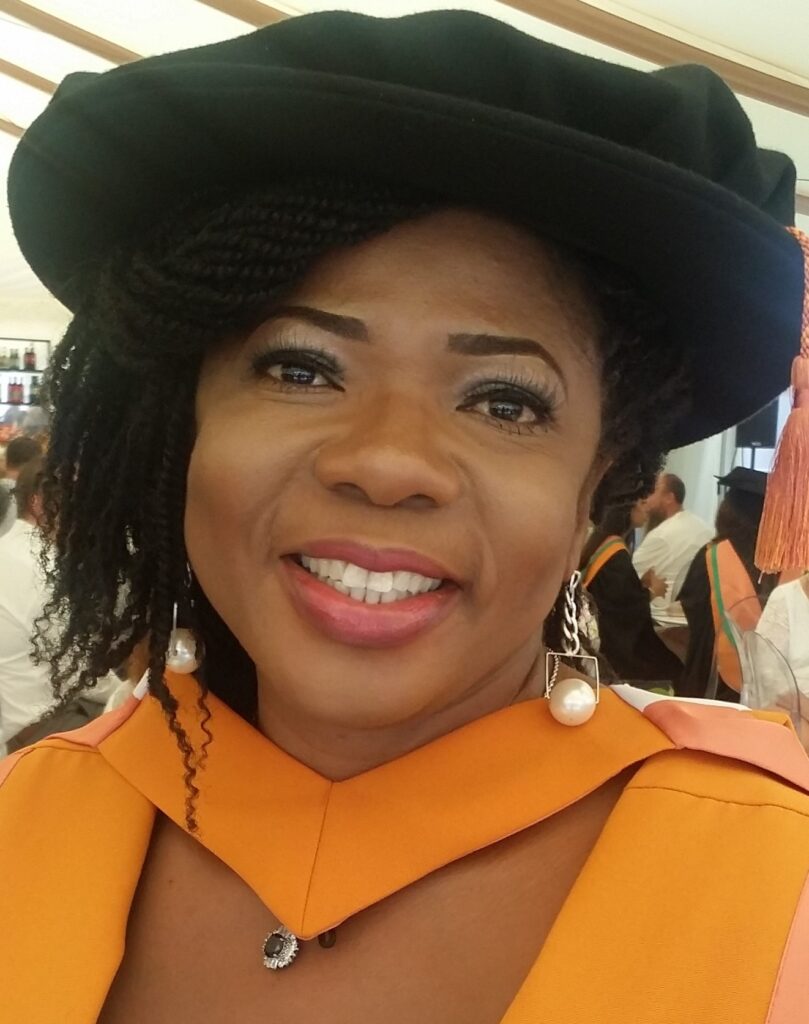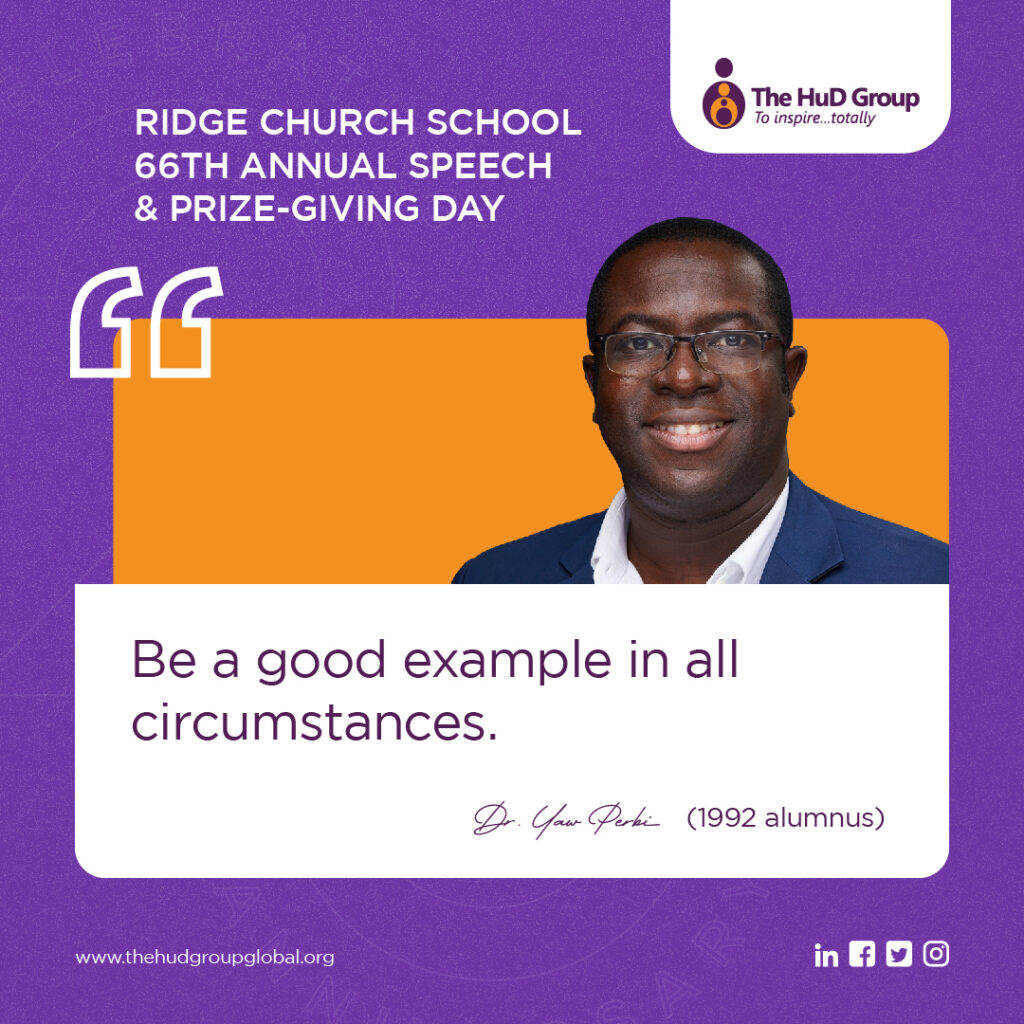
MAN ENOUGH: Fatherhood as a Sacred Responsibility Every Man is Armed For | By Rev. Fr. George Ehusani & Dr. Yaw Perbi
Introduction
Father’s Day is marked annually on the third Sunday of June in many countries across the world. It is a fitting day not only to celebrate the gift of our fathers (and husbands), but also to highlight some of the elements of the unique and sacred vocation of fatherhood. As responsible fathers ourselves (by God’s grace), we take this opportunity to celebrate fatherhood and to encourage all and sundry that what we have been called for, we have been simultaneously designed for and divinely equipped enough to accomplish.
The Source of Fatherhood
In many religious traditions, God the Almighty Creator is recognised as the Pre-eminent Father. God is the One to whom the title of Father truly belongs in an original and primary sense, because God is the Source, the Creator and the Sustainer of the Universe. Human beings are only called fathers in a derivative, participatory, imitative and secondary sense, since in some way through procreation, human agents do partake in the generative process. From this point of view, the fatherhood vocation is a profound and an inestimable privilege for the adult male species. But this privilege of sharing in the human generative process and being addressed as father, like the Almighty Father, comes with critical responsibilities that cannot be shirked on a wide scale without significant deleterious consequences for the entire society and for multiple generations.
For the purposes of this article, by fatherhood we refer to all men, fathers and fathers-to-be, biological and functional alike. Fatherhood is a profound phenomenon that calls for a great measure of accountability on those who knowingly assume the task, or those who have the task foisted upon them by circumstances. We can describe fatherhood as a function, and not simply a title or a name. The father plays critical, irreplaceable roles that shape the lives of the children. He is the progenitor, the source of identity, and the one who enables the children to have a definite sense of self. He lays the foundation for the children that leaves a long lasting impact on future generations. The father is the primary provider, the sustainer, the protector, the guardian, the teacher, and the role model of those who call him father. He is the emotional anchor and the wellspring of stability for not only the children, but also the wife and others who live with them. The father inspires the children, nurturing their dreams and aspirations, encouraging them to reach for the stars and pursue their passions and God-given purpose. He instils confidence and builds self-esteem, paving the way for his children’s success in life.
The State of Fatherhood
Fatherhood is characterised by love and tenderness, but also discipline, decisiveness, courage and sacrifice. Fathers ideally possess an innate instinct to prioritise the safety and wellbeing of the members of their families over their own, ensuring that the wife and the children are shielded from the vagaries of life. With their effort to provide for the family, fathers teach their children the value of hard work, responsibility, diligence, integrity and perseverance; and in this way, equipping the children with the required tools to navigate life’s inevitable challenges and disruptive circumstances. The father is the source of stability and the rock-solid shoulder to lean on, amid the chaos, the insecurity, the instability and the uncertainties of life. He is the source of encouragement, reassurance, and hope, at the most difficult times in the life of the family members. Indeed, fatherhood is a godly enterprise. The fatherhood vocation is an invitation to live out in the concrete circumstances of family life, the human potential for responsibility, commitment, deferred gratification, courage, and sacrificial (selfless) love.
Yet, the number one crisis of the Twenty First Century appears to be the absence of the fatherhood role model. Many young people today are “fatherless,” not because they have no male parent alive, but because their male parent has either been completely absent from their lives, or they have been a source of scandal and trauma, and they are remembered only with pain, regret, and resentment. Thus, often lacking in models of positive masculinity to emulate in their growing years, many young men are today struggling with a variety of character defects that amount to negative masculinity, including the psycho-emotional abuse of their wives, actual physical battering, and remorseless infidelity. Many young men have little or no sense of commitment to their families or responsibility for the children they have brought into the world.
Many children have indeed had their innocent minds defiled and their delicate sensibilities assaulted, as they watched their fathers beat their mothers or heard them vomit venomous invectives on the ones they called their wives. While many young men struggle with what they saw in their formative years, and sometimes they have ended up exhibiting the same traits of negative masculinity in their own marital relationships, many young women on the other hand, have grown up with deep-seated resentment and hateful feelings against the male species in general, on account of what they saw as gross injustices and inequities, or glaring imbalance in power relations between their fathers and their mothers. In many cases what they witnessed as children is the callous and blatant abuse of power and privilege by the menfolk. And it doesn’t help that in the effort to emancipate and affirm women and girls over the last half-a-century, positive masculinity has suffered both direct and collateral damage.
The global celebration of Father’s Day this year is a most fitting occasion to remind the men—the fathers, the would-be fathers and the father-figures in our society—to spare a moment to reflect on the enormous privilege and the sacred responsibility that come with fatherhood, and to work in concert with other individuals and groups, towards overcoming the gross anomaly of toxic masculinity that contradicts all the lofty ideals of fatherhood outlined above. Far from being a bully, the husband who often doubles as father, is ideally “one who cultivates, nourishes, tills, and tends” the wife and the children. The male headship of families in our society is not something to be achieved through domination and coercion, but through a high sense of responsibility, commitment, and sacrifice. Today, experts in the Christian Scriptures hold that even the allegedly controversial statement of St. Paul in Ephesians Chapter 5, that wives should be submissive to their husbands, is (in the context of the entire passage and in the context of the teachings and practical examples of Christ), not an endorsement of any form of misogyny, to be expressed in psychological abuse, wife battering or domestic terrorism. Instead, the husband is admonished to love, cherish, and honour his wife.
The Supply of Fatherhood
While gender-based violence (and such) tends to be associated with males’ abuse of power, perceived or real, a concomitant but often missed cause of such negative masculinity actually comes from a place of inadequacy. Hurting people hurt people, insecure people make others insecure too. Men who abuse others often do so from a place of feeling inferior or being too small in the head or heart to handle perceived or real threats to their person or towards what they care about. On this Fathers’ Day, we call on all men—fathers and fathers-to-be alike, both biological and functional fathers—to know that they have all that is needed and have all that it takes for positive masculinity. You are enough, man enough. Abusing others doesn’t make you a man; it actually makes you less of a man. Even less of a human.
In encouraging men to rise up to life’s challenges and to live out their God-given identity and purpose, the expression used in many contexts is “man up.” However, inherent in ‘manning up’ is the danger that one has to harness some ethereal resources and put forward a personality that is neither them nor theirs. On this Father’s Day, again, we sound a clarion call and offer an alternative paradigm to ‘manning up’: man enough! You are man enough. Where you feel or fear a lack of wisdom, courage or strength, call to the ultimate source and intricate designer of fatherhood Himself: Father God. Author and apostle James concurs: If any of you lacks wisdom [to guide him through a decision or circumstance], he is to ask of [our benevolent] God, who gives to everyone generously and without rebuke or blame, and it will be given to him. (James 1:5, Amplified Bible) Being a good man isn’t just good for others, it is good for you. One has such a sense of fulfillment and happiness having accomplished the purpose of one’s being.
Conclusion
Finally, recognising that many young men today have not had the good fortune of being raised or mentored by exemplary fatherhood role models, perhaps individuals and organisations, and especially religious groups, who are sufficiently invested in the promotion of positive masculinity for the wholesome development of our society, must begin to take on the project of healing our youths of their traumatic experiences with toxic masculinity while growing up, and forming the boys particularly in the above outlined principles and practices, values and virtues of ideal fatherhood. Men, you are man enough. Happy Father’s Day.
This op-ed is an initiative of the Ford Foundation Office of West Africa towards ending Gender Based Violence.
The writers:
Rev. Fr. George Ehusani, Executive Director of Lux Terra Leadership Foundation, Abuja Nigeria.
Dr. Yaw Perbi, Founder and Global CEO of The HuD Group, an international human development NGO (www.thehudgroupglobal.org).
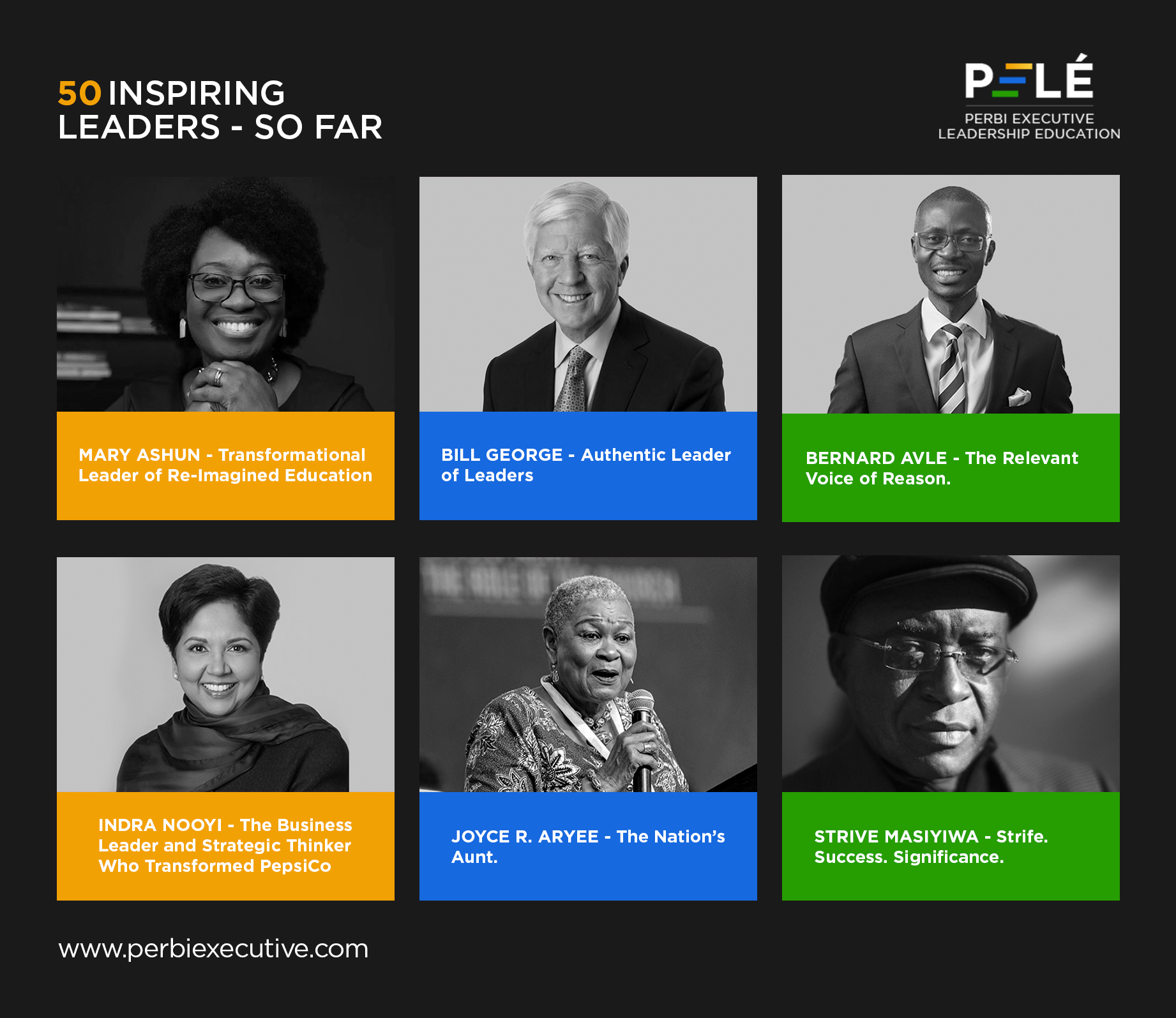
50 Inspiring Living Leaders
Dear Leader,
If you haven’t yet checked out the first 10% of the 50 Inspiring Living Leaders on the Perbi Executive Leadership Education (PELÉ) website, catch up quickly and get some oxygen for you leadership journey:
1. STRIVE MASIYIWA—Strife. Success. Significance: https://perbiexecutive.com/strife-success-significance…/
2. JOYCE ARYEE—A Nation’s Aunt: https://perbiexecutive.com/a-nations-aunt-joyce-r-aryee/
3. INDRA NOOYI—The Business Leader and Strategic Thinker Who Transformed PepsiCo: https://perbiexecutive.com/indra-nooyi-the-business…/
4. BERNARD AVLE—The Relevant Voice of Reason: https://perbiexecutive.com/bernard-avle-the-relevant…/
5. BILL GEORGE—Authentic Leader of Leaders: https://perbiexecutive.com/bill-george-authentic-leader…/
6. MARY ASHUN—Transformational Leader of Re-Imagined Education: https://perbiexecutive.com/mary-ashun-transformational…/
This 50 Inspiring Living Leaders series highlights current influencers who are succeeding in leadership, integrity, family or entrepreneurship in whatever field and exhibit most, if not all, of our values of PELÉ. We value people, growth, particularity, excellence, success, authenticity and significance. These stories are largely written in terms of growth, success and significance in leadership, integrity, family and entrepreneurship. While we do our best to receive personal references about each leader, most of our research and writing is based on literature review of publicly-available information. As authorities in leadership, we are fully aware that there is no such thing as a perfect leader, and leaders may have their flaws, but we choose to celebrate these inspiring living leaders for their achievements outlined in our series. Having said that, should you happen to have any incontrovertible evidence that any of our featured leaders does not fit our bill of an authentic leader, please write to us at info@perbiexecutive.com. Our vision at PELÉ is a flourishing global ecosystem of authentic leaders characterised by healthy growth, holistic success and lasting significance.
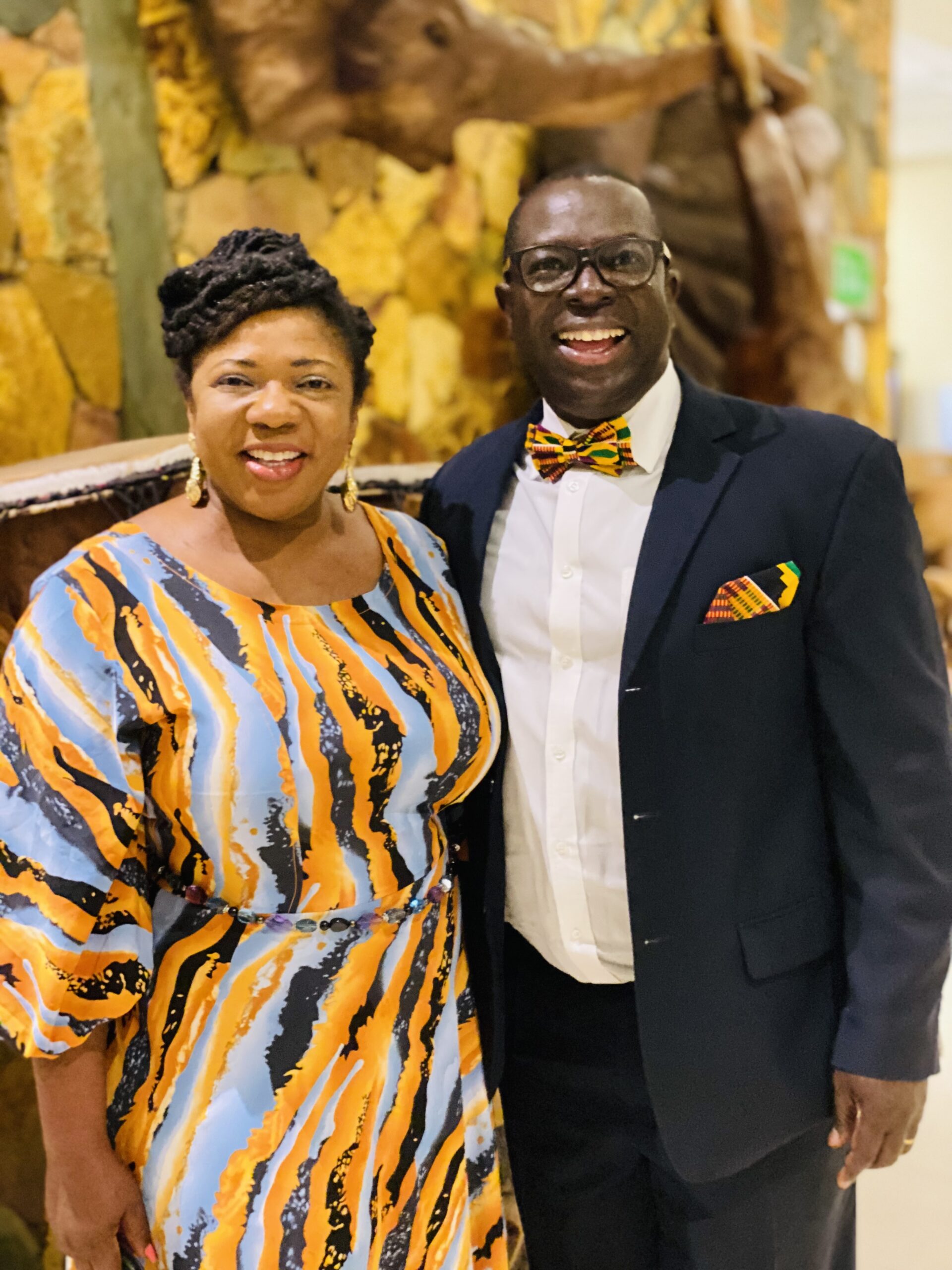
Meet The Nursing Doctor That Beat “Medico or Suicide!” Fair and Square
In those mid ’90s, one had to do a year (Level 200—if from the old O’ and A’ level system) or two years (Levels 100 and 200—from the new Junior and Senior Secondary School system) to see who qualifies, per superior GPA, to be called for the University of Ghana Medical School interview.
If my memory serves me right, of the nearly 900 of us, only a third made the interview list; and of that, only another third were admitted to medical (and dental) school. Folks were so bent on making the final 100 who will don the coveted white coat and carry boxes of bones on and off the med school bus that the mantra was “medico or suicide!” It was a serious threat in those heady undergraduate days.
I personally don’t recall anyone who didn’t make the cut actually physically killing themselves but many died emotionally, mentally and even socially. That nonsense killed many brilliant minds. I know of some that had to take a year off to heal; some even left the country for a bit. I still meet people who seem to be a pale shadow of themselves prior to this deathly mantra.
CAREER = PROFESSION + FIELD
I hope that career and counselling services have improved for the current generation but I can tell you for a fact that most of us were too young, back in the 1990s, to even definitely know what we wanted, career-wise. O of course many of us thought we knew, just like we thought we knew who we wanted to marry. Probably 0.0001% of us ended up marrying who we ‘so sure’ about.
In fact, many of us mixed up the passion for the general field (healthcare) with a passion for a particular profession (medical doctor). I was fortunate to learn the CAREER = PROFESSION + FIELD formula from the What Colour is Your Parachute? publication and many in that biological sciences pool could’ve found use for it too. Take my friend Retha (true story but not her real name), for example. She was a couple of years behind me. She didn’t make the dreaded med school list. And you wouldn’t believe the kind of hell her parents subjected her to, as a result. Thankfully she weathered the storm and did great at her plan B: Psychology. She loved it and excelled at Clinical Psychology in particular so much that she continued with graduate studies and eventually landed a PhD in it, in the United States of America.
Think about it: she still ended up in the field of healthcare which she was passionate about but realised she didn’t need to have the profession of a medical doctor to pursue that passion. The competent psychologist she became satisfied the same passion and fulfilled her calling. In any case, she’s still called “Dr.” today in her practice and who the heck cares if she earned the “Dr.” title from med school or from grad school, especially if she’s doing one heck of a good job in the clinic.
THE NURSING DOCTOR
These thoughts above were provoked by attending a recent Doctors in Business banquet at the Holiday in Accra, Ghana. As a guest keynote speaker, I had the privilege of sharing the high table with a course mate from Level 100 at the University of Ghana, Legon. We were both introduced as “Doctor” but I could swear she wasn’t in med school with me. By the end of the night it turned out that both the MC and myself were right. She was not med school with our batch, and she isn’t a medical doctor (I was right); but she is a doctor alright, a doctor in nursing (the MC was right).
“So I did biological sciences with you guys at Level 100 because I came to Legon as a science student,” Dr. Lillian Akorfa Ohene (PhD, MPhil, PN, BSc) intimated to me, but fortunately she wasn’t of the “medico or suicide!” tribe. “I branched off to nursing after level 100 because nursing was my first choice.” I’ve been so impressed that she knew exactly what she wanted even back then (forget the prestige of med school) and went straight for it. It reminds me of a brilliant 4.0 (perfect GPA) friend of mine who could’ve easily made it to med school but also chose to do Nutrition and Food Science, in the steps of her food scientist dad. She’s doing well in the industry, a leader of leaders.
Beyond knowing what she wanted and decisively moving towards it despite the definite distraction of medicine, Lillian’s story is also serendipitous as “the road rose to meet her.” She continues the conversation thus: “…but it happened that at that time, the nursing program started at level 200.”
IMPRESSIVE CURRICULUM VITAE
Today, Dr Lillian Akorfa Ohene is a Senior Lecturer and the Head of Department for Public Health Nursing at the University of Ghana’s School of Nursing and Midwifery. She is a certified paediatric nurse, who holds a PhD in Nursing from De Montfort University, Leicester, UK, a Master of Philosophy and Bachelor of Science in Nursing, both from the University of Ghana.
Lillian has over twenty (20) years of practice and teaching experience in higher academic institutions. Her research interest focuses on holistic care of sick children and the well-being of women and their families. As a qualitative researcher, she has explored extensively, the concept of family-centred care among sick children in the Ghanaian context. Some of her findings have been published widely in both local and international peer-reviewed journals. She also serves as a reviewer for several international journals.
On the international stage, Dr Ohene is a member, and a faculty counsellor of Chi Omicron Chapter of the Honor Society of Nursing, Sigma Theta Tau International (STTI) at Indianapolis, USA, a member of West Africa Postgraduate College of Nurses and Midwives (WAPCNM) and a foundation fellow of Ghana College of Nurses and Midwives (GCNM).
Dr. Ohene is also a Queen Elizabeth Scholar (QES) and serves as a mentor to her students, nurses and midwives locally and internationally. She has supervised over a hundred research projects, from undergraduate to PhDs. She is passionate about students’ academic success. The reason for our crossing paths last weekend is that she currently serves as a patron for three different student associations at the University of Ghana, of which Doctors in Business (DIB) is one. She serves on the board as well. Lillian is a family woman, married with three young adult children.
LILLIAN LESSONS LEARNT
Don’t die when life doesn’t go your way (death isn’t only physical); live to make so much of the further opportunity that rises to meet you that it’s a dis to that previous appointment (‘disappointment’). Through self-awareness, from introspection as well as feedback (take coaching and counselling seriously), know who you are and what you want and go for it. That’s where your future lies; don’t get distracted by the bling (even if its a shiny jewel like medicine). Yes, pursue your passion but be careful not to confuse the field and the profession. And remember that when you make a move, even when you don’t know what the next move after that step is, serendipity happens. Just make the move; it’s actually not moving at all that just might be suicidal.
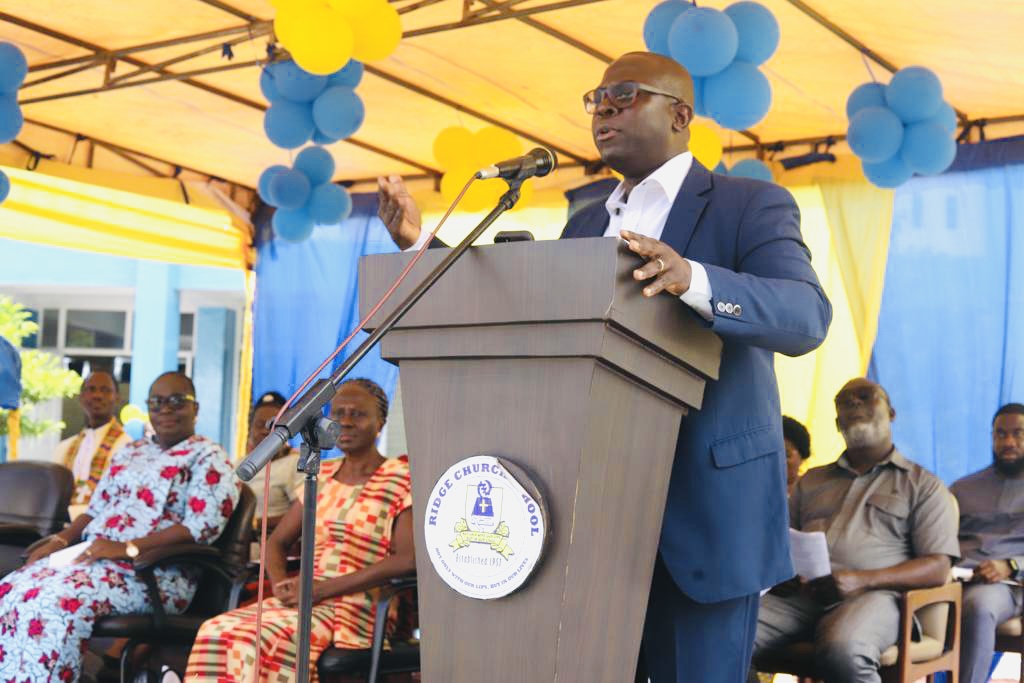
Be a Good Example in All Circumstances ~ 66th Annual Speech & Prize-giving Day, Ridge Church School
66TH ANNUAL SPEECH & PRIZE-GIVING DAY, RIDGE CHURCH SCHOOL
SPEECH BY DR. YAW PERBI, Global CEO of The HuD Group
26th August, 2023
Chairperson, Guest of Honour, School Board and Management, Teaching and Non-Teaching Staff, Parents and Learners, Invited Guests, (all protocols observed), good afternoon. It is an honour to return to Ridge Church School to address you today after leaving here 31 years ago. And it is a double honour as this is the second time I’ve been invited to do so over the last two decades.
The theme chosen for this year is BE A GOOD EXAMPLE IN ALL CIRCUMSTANCES and we shall consider it in three simple ways:
- WHAT IS?
- WHO SHOULD?
- WHY MUST?
1. BE A GOOD EXAMPLE IN ALL CIRCUMSTANCES: WHAT IS?
You must’ve heard from my introduction that my wife and I are blessed with seven biological children. Well, on Monday morning, our delightful six-year-old daughter, our fifth child called Nana Ahomka, came to tell me, “Daddy, I should be a leader at AWANA,” a children’s Bible training program. When I asked who a leader is she said, “Someone who sets an example for everyone else to follow.” I replied, “You got that right girl,” and that gave me the essence of my message today.
Today, the word “leader” is overused and abused. But for a moment, forget about all the 360 plus official definitions (yes) and consider this: a leader is someone who sets an example for others to follow. A good leader sets a good example; a bad leader does the opposite. Seeing it that way, a lot of so-called ‘leaders’ are really not good ones, even if they are in powerful political positions, are sensational speakers or even have top professions and enviable riches. Recently, we have seen our parliamentarians insulting and throwing physical blows in parliament. That is bad leadership. And it needs to be called out for what it is.
So WHAT IS being a good example in all circumstances? Good leadership or Godly leadership.
2. BE A GOOD EXAMPLE IN ALL CIRCUMSTANCES: WHO SHOULD?
Everyone of us, especially you, young ones—YOU ARE NOT TOO YOUNG TO BE AN EXAMPLE.
The Little boy Samuel was only 12 years old and could hear God’s voice at a time when “the word of the LORD was rare; there were not many visions.” [2] He heard God’s voice and told the ‘Papas’ of the land what to do. Ghana could use some Samuels right now—YOU!
That is what Paul the mentor meant when he said to his teenage mentee Timothy, “Don’t let anyone look down on you because you are young, but set an example for the believers in speech, in conduct, in love, in faith and in purity.” [3] In fact, sometimes it’s the adults that actually encourage us to do the wrong thing: I shall never forget my BECE experience in 1992 when a female invigilator who noticed I had completed my work, suggested to me to write the answers on an eraser so she could give it to another person who was struggling! Imagine that. An invigilator! I said, “No Madam. That is not right.” She was shocked.
Sometimes people don’t like us for not following their bad example or for calling out their bad example. But in a good society, good examples are reward. For example when I went to Achimota School, my good example was observed by the staff and I was selected to represent Achimota in exchange programme in America. It is also good examples who are selected to be prefects here, right?
Even at the university, I had to resist cheating in exams and started an organization called The HuD Group (The Human Development Group) [4] to help young people to become good leaders. When I got a national award for this, handed to me by then then Vice President of Ghana, Hon. Aliu Mahama, as the Newmont Ghana Highest Achievement Award winner at the Millennium Excellence Youth Awards in 2006, our Minister of Health then, Major (Rtd.) Courage Quashigah, wrote me a congratulatory letter, part of which read:
“We in the health sector are very proud of you and urge you to continue to be an Outstanding Achiever… It is my hope that you will bring your charisma and devotion to bear on every youth you encounter and they in turn will emulate your leadership example. On behalf of the entire health sector and on my own behalf, please accept my congratulations.” [5]
So WHO SHOULD be a good example in all circumstances? Everyone, especially you young ones!
3. BE A GOOD EXAMPLE IN ALL CIRCUMSTANCES: WHY MUST?
In 1792 King Louis XVI (16th) was taken from his throne by some rebels and imprisoned. His young son, the prince, was taken by those who dethroned the king. They thought that inasmuch as the king’s son was heir to the throne, if they could destroy him morally, he would never realize the great and grand destiny that life had bestowed upon him. They took him to a community far away, and there they exposed the lad to every filthy and vile thing that life could offer. They exposed him to foods the richness of which would quickly make him a slave to appetite. They used vile language around him constantly. They exposed him to lewd and lusting women. They exposed him to dishonor and distrust. He was surrounded 24 hours a day by everything that could drag the soul of a man as low as one could slip.
For over six months he had this treatment but not once did the young lad buckle under pressure. Finally, after intensive temptation, they questioned him. Why had he not submitted himself to these things why had he not partaken? These things would provide pleasure, satisfy his lusts, and were desirable; they were all his. The boy said, “I cannot do what you ask, for I was born to be a king.” [6]
Ladies and Gentlemen, we are all born to be kings and queens, princes and princesses, in the kingdom of God. WHY MUST you be a good example in all circumstances? You were born to be royalty.
CONCLUSION
In conclusion, be a good example in all circumstances. “The time is always right to do what’s right,” as Martin Luther King told some (Oberlin) students. Be an example, be a leader. As young as you are, even if everyone is doing the wrong thing and adults are pushing you to, be a prince/princess because:
1. that’s who you are—you were born to be a leader, to be king/queen
2. that’s what God’s word says and God expects
3. it’s for your own good (there’s no law against being a good example or punishment for it)
4. society needs it today and will remember you in history
5. Almighty God will reward you. Say, “Heaven backs me when I do the right thing!”
Be a good example—whether you are 6 or 60! Be the king and queen you were born to be. Be a good example in all circumstances, BE A GODLY LEADER!
References
[1] https://www.bbc.com/pidgin/tori-59738001[2] 1 Samuel 3:1, NIV
[3] 1 Timothy 4:12, NIV
[4] See www.thehudgroupglobal.org
[5] Portion of letter by Hon. Minister of Health in 2006, emphasis mine
[6] Sean Covey, The 7 Habits of Highly Effective Teens (and other sources)
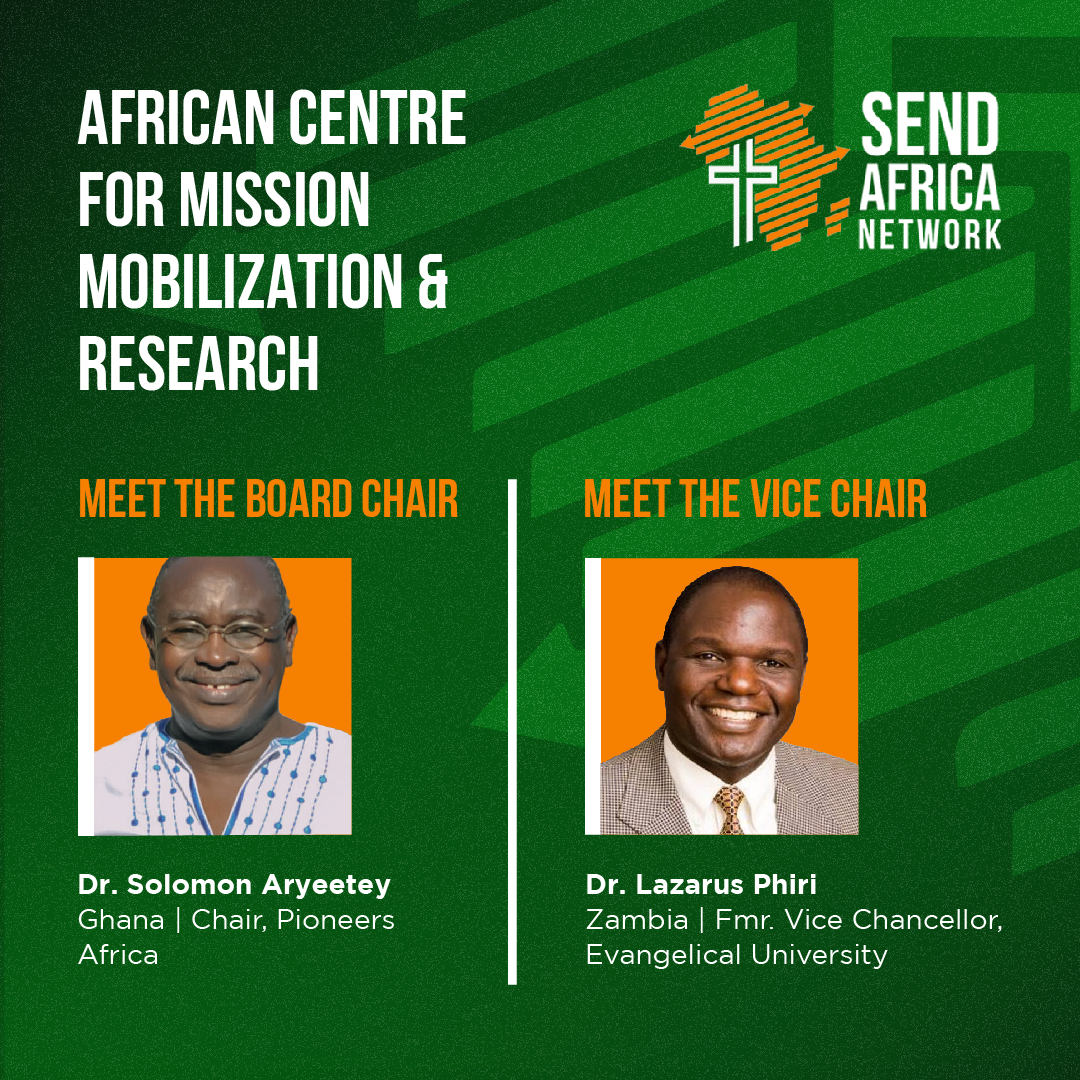
No Limit On God-sized Visions; But For Our Egos & Logos.
The year I turned 40 is the same year that Africa became the continent with the most Christians in the world. Wanting both momentous occasions to mean something beyond a year and a number, I had been musing over the idea of an ‘African Centre for Global Mission Mobilization’ for serious research and intellectual power to be brought to bear on this African phenomenon which is undoubtedly the work of God’s Spirit.
In fact, in the first quarter of 2018 I even initiated discussions with Steve Shadrach’s Centre for Mission Mobilization about the possibility of partnering to pull off an ‘African Centre for Global Mission Mobilization’ in Ghana. At that time, I was still President of International Student Ministries Canada and incidentally had my entire Senior Leadership Team visiting Ghana from Canada. In the presence of my ISMC team, friends and family from near and far, during my fortieth birthday dinner on 16th March 2018 at the Fiesta Royale Hotel in Accra, Ghana we actually formally launched the idea (or should I say effort?). I had no clue how it was going to pan out but I sensed it was not just a good idea; it was a God idea.
THE BRAZIL BENEDICTION
Unbeknownst to me, Mr. Ebenezer Aryee, a Ghanaian health worker domiciled in the United Kingdom and serving on the board of Pioneers Pioneers UK, had also been independently pondering over the prospect of an ‘Africa Centre for Mission Mobilization and Research’ since about 2017 and mooted the idea to Pioneers UK as well. Incidentally, Eben and I first met in person at the Global Mobilization Network’s conference in Dubai that same year but had no such discussions.
Come 2019, at the next biennial Global Mobilization Network’s conference in Sao Paolo (Brazil) in December 2019, both of us found out that we had a similar vision from the Lord and decided to explore what a possible convergence and synergy could result in for the sake of the greater Kingdom of God. Incidentally, that is the same conference at which upon hearing Dr. T.V. Thomas’s stirring exhortation about “radical collaboration” for the sake of the global Church finishing the task Jesus Christ left us, I agreed to co-author Africa to the Rest with Sam Ngugi, although I had started the book the year prior and was more than half-way, or so I thought.
SUPERSONIC SPEED SINCE SAO PALO
Since that time in Sao Paolo, many other African men and women from all over the continent, and in the diaspora, ranging from mission practitioners to academics, have been consulted and/or roped in. After an initial year of various research, discussions and SWOT analysis by this array of consultants, it became so overwhelmingly clear that not only was the African Centre for Mission Mobilization & Research (ACMMR) an idea whose time had come, but also that it was an urgent one for that matter. An interim board was set up by Send Africa Network, itself a new pan-African mission agency that Eben and a couple of others were in the process of founding and roped me in. The ACMMR interim board comprised Dr. Harvey Kwiyani (Malawi/UK), Prof. Philip Antwi-Agyei (Ghana), Dr. Lazarus Phiri (Zambia), Dr. Andrew Mkwaila (Malawi), Dr. Esther Mombo (Kenya), Dr. Joshua Bogunjoku (Nigeria/USA), Madam Angéle Kalouche Biao (Benin) and Rev. Ebenezer Aryee (Ghana/UK). I had the honour of chairing it.
The centre was outdoored, online, at Send Africa’s first summit, online, in 2021. This interim board, among others, determined that Ghana might be the most suitable place to physically site the ACMMR, with possible satellites across the continent. After physically scouting a number of possible places and holding various bilateral talks, the Akrofi-Christaller Centre for Theology Mission and Culture (ACI) was finally settled on as the most germane.
SEND AFRICA NETWORK SUMMIT 2022
At the November 2022 Send Africa Summit in Accra, Ghana, a hybrid summit, among the several dignitaries present was Dr. Rudolph Gaisie, director of the Centre for the Study of Early African Christianity (CESEAC) at ACI (the significance of him being there would soon become apparent). A fundraising event was held for the ACMMR and a permanent board commissioned comprising: Dr. Harvey Kwiyani (Malawi/UK), Rev. Dr. Solomon Aryeetey (Ghana), Mr. Alan Webster (South Africa), Dr. Lazarus Phiri (Zambia), Rev. Daniel Hyde Appiah (Ghana), Ps. Kassum Balboné (Burkina Faso), Mr. Sam Ngugi (Kenya), Rev. Ebenezer Aryee (Ghana/UK), Madam Angéle Kalouche Biao (Benin) and Dr. Yaw Perbi (Ghana/Canada). A delegation from the new board and some delegates from the Send Africa Summit paid a courtesy call on the Registrar of ACI, Mr. Ben Asiedu, at the Akropong premises. Dr. Rudolph Gaisie took the group on a tour of the facilities, while sharing some of the vital history of the institute.
Rev. Dr. Solomon Aryeetey, medical doctor and founder of Pioneers Africa, was elected as the substantive board chair, at the board’s inaugural meeting, online, in December 2022. Dr. Lazarus Phiri, immediate pst Vice Chancellor of the Evangelical University in Zambia was selected as his vice, while Mr. Alan Webster of Wycliffe South Africa serves as the secretary.
LESSON LOOMING LARGE
There is no end to what God can do with humans who are willing to listen to His instructions and collaborate with His people. Usually, you know a vision is of God when it is far bigger than you and you know you firstly, you’ve got to depend on him and secondly, that you need others to rally around it. Once when I was struggling with taking up the offer to be ISMC president because I preferred to focus on building ‘my own baby’ The HuD Group as the founder and Global CEO, the Holy Spirit brought to mind the instructive words of a mentor of mine, who for years had been Dr. John C. Maxwell’s Senior Vice President at his leadership organization called EQUIIP in Atlanta. He had said to me: “For a long time, the Kingdom of God has not advanced the way it should because of egos and logos.” Ouch.
Imagine that the powerful Africa to the Rest making its rounds around the world would not have happened the same way without my co-author’s unique perspective, experience and network from East Africa. Today, we have a group of scholars from five or six countries collaborating to turn the book into a resource course for tertiary students. At the start of August 2023, Operation Mobilization’s ship ministry, Logos Hope, reached out to stock the ship with 500 copies of Africa to the Rest to be distributed across the continent, from Mombasa to Seychelles, and beyond. What if my ego and logo had gotten in the way.
As I type this, plans are far advanced to organize the formal signing of a Memorandum of Understanding between ACMMR and the Centre for the Study of Early African Christianity (CESEAC) at ACI, with an inaugural lecture on the serene premises. Neither Eben or myself even have our faces on ACMMR posters or our names as chair, or even vice chair or executive director. I dare say most of the people pushing the vision today don’t even know this back story I’ve just shared here!
And that is the beauty of making the only ‘ego’ that matters be the glory of God and the only ‘logo’ that is of prime concern, the cross of Jesus Christ! The aim of the centre is knowledge-based total mobilization of the most numerically Christian continent this century for the mission of God..
Indeed, if it is true that one would chase a thousand and two will put ten thousand to flight, then imagine what is exponentially possible with convergence and synergy. See what unity of purpose devoid of egos and logos could result in for the sake of the greater Kingdom of God. So you see, there is no limit on God-sized visions; but for our egos and logos.
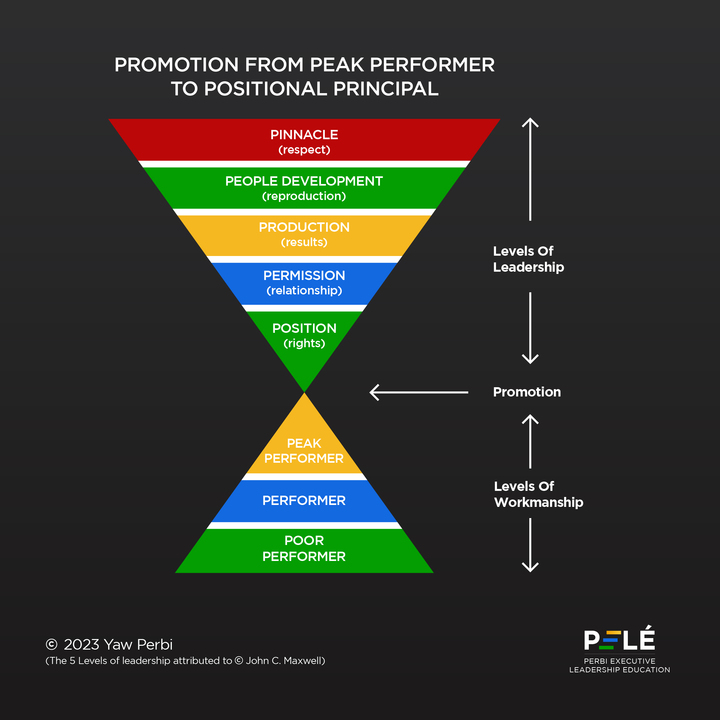
The Best Promotions are the Worst.
Here’s the worst thing about the best promotion. At one of my organizations, we recently had to let an excellent hire go. Come to think of it, we failed him. We failed him by promoting him.
You would think that all promotions are good but no. One of the worst kinds is being ‘elevated’ to become a leader just because you are an outstanding worker or producer. Working on stuff and excelling is very different from working with souls to excel. The reward for hard work is more work, weird yes, but the latter tends to be more mental work than manual —which most people find as more beneficial—also, more of working with people than working on things.
As one person shared about struggling with leadership upon her first promotion as a telco manager: “Within one month, I went from being the best programmer to the worst supervisor.” I’ve seen this happen to too many people in too many places. I grew up on the University of Ghana campus (both my grandfather and mother were professors there) and I would see time and time again fine lecturers promoted into leadership positions, from heads of department through deanship to vice-chancellorship and flail and fail. How many times have I said that a great chemist or erudite historian doesn’t necessarily make a great leader!
We do the same in the medical world, promoting top surgeons to head departments or if God doesn’t intervene, to head the hospital! When I was promoted to supervise the Military Polyclinic at the 37 Military Hospital in Accra, determining the doctors scheduling and all, in my opinion it was only because I wasn’t a bad doctor and had been around long enough. And no one gave me a minute’s training about leadership. Squat. Thank God I had been a private student of leadership for years prior.
It doesn’t start out as a bad thing; in fact, it is exhilarating at first for the recipient of the promotion. And the giver of the opportunity ordinarily also means well and feels good about it. But organizational leaders need to rethink the notion of making people supervisors, managers or leaders as a reward for diligent or even skillful individual technical work. It can backfire, seriously.
A STORY I CAN’T GET OVER
One of the most poignant illustrations of this phenomenon of worker/rewarded-as-leader is told by my mentor Bill George in his book ‘True North.’ It’s about the person who confessed upon her first promotion as a telco manager, “Within one month, I went from being the best programmer to the worst supervisor.” Here are some more details:
“It’s unbelievable how bad I was. I didn’t know how to delegate. When somebody had a question about their work, I’d pick it up and do it. My group was not accomplishing anything because I was on the critical path of everything. My boss saw we were imploding, so he did an amazing thing: He gave me every new project that came in. It was unreal. At 4:30 PM, my team would leave, and I’d be working day and night trying to dig through this stuff.
“Finally, I couldn’t take it any longer. I went to his office, stamped my foot like a 5-year-old, and said, “It’s not fair. I have the work of 10 people!” He sad calmly, “Look out there. You have 10 people. Put them to work.” It was such a startling revelation. I said sheepishly, “I get it.”” [1]
If this person hadn’t eventually learned to lead people, she would never have made it to becoming president and CEO of the American Red Cross on June 23, 2008. Prior to that she had also held top management positions at AT&T Corporation and Fidelity Investments. She is a member of the board of trustees of Johns Hopkins University and the board of directors of DTE Energy.
This is Gail J. McGovern we’re talking about here, even recognized by Fortune magazine in 2000 and 2001 as one of the top 50 most powerful women in corporate America. Alas, not all of such stories that begin with such ‘good promotions’ end well, and even when they do, not without significant damage to many.
DIAGNOSIS OF LEADERSHIP FAILURE POST PROMOTION
It takes both a different mindset and skill set to move from being an excellent worker to being a good leader, let alone a great one. Yet we come to the world of work with both a mindset and skillset that ill-prepare us for leadership success. Even prior, we are socialized largely to excel as individuals. I concur with Bill George that this unpreparedness is attributable to our upbringing:
“…so much of our early success in life depends upon individual efforts, from the grades we earn in school to our performance in individual sports to our initial work assignments. Admissions offices and employers closely examine those achievements and use them to make comparisons. …As we are promoted from individual roles to leadership, we believe we are being recognized for our ability to get others to follow us…
“To become authentic leaders, we must discard the myth that leadership means having legions of supporters following us as we ascend to the pinnacles of power. Only then can we realize that authentic leadership is serving people… How else can they unleash the power of their organization unless they motivate people to reach their full potential? … Only when leaders stop focusing on their personal needs and see themselves as serving others are they able to develop other leaders.” [2]
ROAD MAP TO LEADERSHIP SUCCESS POST PROMOTION
If Maxwell’s 5 Levels of Leadership is anything to go by, then when one is promoted from the top echelons of the worker floor (Peak Performer/Worker Level 3 in diagram above), they only end up at Level 1 of leadership: Position. The lowest level of leadership—the entry level, if you will—is position. People only follow if they believe that they have to (otherwise you might use your powers of carrot and stick). If this leader takes the hint and invests in their leadership growth, they can move to Leader Level 2—Permission—which is based on relationship. At this level, people choose to follow because they want to.
You will notice that even what Gail was trying to get done at work, putting the 10 people ‘out there’ to work, is still only mid-level in the Maxwell scheme of things: Production. Good leaders know how to motivate their people to GTD – get things done! And getting things done is what Leader Level 3 is all about. But they’re only good; not great. Leader Level 4 — People Development—can be summed up in another word: Reproduction. One’s goal at this level is to identify and develop as many leaders as one can and investing in them to help them grow. Here (Leader Level 4), you’re producing people as leaders, not producing work through people (Leader Level 3).
The most challenging and highest level of leadership, Level 5, is the Pinnacle. According to Maxwell, it requires longevity as well as intentionality in investing one’s life into the lives of other leaders and organizations for the long haul (while growing yourself as lifelong learner all the while). People follow such because of who they are and what they represent. Their leadership gains a positive reputation, betters still, one has earned respect.
Note that Level 5 leaders develop Level 5 organizations. I will add that in the leader versUs institutions debate—as to whether it is strong leaders or strong institutions we need to develop long-term—I would say that it takes Level 5 leaders to build the structures and systems that produce strong institutions. This is the realm of legacy. As a result, Level 5 leaders often transcend their position, their organization, their industry and perhaps even their nation.
And nothing accelerates leaders through these levels, from 1 to 5, like intentional coaching.
CONCLUSION
As you can tell already, it’s a long way from being the best worker to being a great leader. There is nothing more painful than a “highly capable individual” (as Jim Collins puts it) thinking that just because they’ve been a peak performer and ‘made it’ onto the supervision, management or leadership floor that they’ve got what it takes to run the ship. One’s productive contribution through individual effort in knowledge, skills and good work habits won’t cut it. As promoters, if we promote people and fail to plan a leadership growth path alongside that, we’ve inadvertently planned to fail them.
Congratulations on your promotion, but to ensure that dream-come-true doesn’t become a nightmare, and the reward a trap instead, you must be aware that it’s a floor and not the ceiling. Top floor workers’ triumphal entry through the golden portal of promotion only lands you as a ground floor leader. Welcome to Level 1 of Leadership: position. Just that.
References
[1] Bill George. True North: Becoming an Authentic Leader. Second edition; expanded and updated edition. Jossey-Bass, Hoboken, NJ, 2015, pg. 186-187.
[2] Ibid, pg. 185

The Inadvertent Lid of Political Leadership: My One Regret and Heartache.
It’s been a very busy few weeks. The last one in particular was the kind that Nelson Mandela would call “‘impossible’ until it’s done.” The very morn of the dawn I arrived back in Accra from Kenya, the first day of the work week, I had to be speaking at about 10am at an African Young Professionals Conference. That same week my team at PELÉ and the Ghanaian contingent of the African-wide BCA Leadership hosted the power-packed, two-day Made in Africa Leadership Conference (MLC) from June 13 to 15. Then there was a Youth Rally in the vicinity of the University of Professional Studies (June 15 evening) where l was billed to speak as well. And then to crown that week, The HuD Group, which I founded with eight of my friends in 2003, held a press launch of our twentieth anniversary and simultaneous launch of three legacy projects.
In all of this business and busyness, one thing that has come through very clearly is that leadership is absolutely important–that everything does rises and falls on leadership. I tried to make that point in my opening remarks to the distinguished ladies and gentlemen convened at the Marriot for the aforementioned MLC 2023. Even this morning, as I was training the executive team of one of our PELÉ clients, a tech start-up, Maxwell’s Law of the Lid came to the fore: leadership is the lid on their personal level of effectiveness as well as the organization’s impact that it would ever make.
Leadership is so important that every professional must have it, everyone in every sector of the economy must possess it, and everyone at every level of society must have it but especially leadership is too important to leave it to politicians alone. “Leadership is cause,” as one other leadership expert puts it, “everything else is effect.”
As we celebrate 20 years of The HuD Group, we can testify that God has done amazing things in, on, with and through The HuD Group. We started in Ghana, moved to Cote D’Ivoire, then to Nigeria and Canada and now have a presence in 24-25 countries on all continents, having incredible impact on people in every sphere. In fact, at the anniversary launch last week Friday, several VIPs like celebrated, young, award-winning journalist Manasseh Azure Awuni, shared how The HuD Group had impacted them. But I shared with the audience my one regret: that in all this 20 years of The HuD Group we did not give enough attention to the political space in particular. Of course, it is not that we did nothing at all but knowing what l know now and seeing how successes in all these other areas of life have literally been eroded by what has happened in the political space, especially in Ghana, that really breaks my heart.

This brilliant friend just graduated from Columbia Law School. I told her I was going to share this beautiful photo on social media as it illustrates my frustration that a lioness like her will be returning home to Ghana only to be led by goats.
THE SKY ISN’T THE LIMIT; POLITICIANS ARE
This has been a season of lots of graduations. I’ve seen flashy photos from Harvard to Fuller, and been physically present at inspiring commencements like Ashesi’s about three weeks ago. First, I’ve been excited about all these amazing graduates bustling with energy and vision and drive, some having done some earthshaking capstone projects and all. Yet all these amazing people formally graduated by our best academic establishments and semi-formally by The HuD Group in the last 20 years—and yes, some of us have been though all kinds of fellowships from Aspen and Eisenhower to Tutu—are restricted by what happens in the political space because everything rises and falls on that leadership. Political leadership is the lid over all our collective effectiveness and greatness.
If anyone told these graduands that the sky is the limit, that isn’t wholly true; our political leaders are. No I’m not a whiner; I am precisely the opposite of that, which is why I’m a serial entrepreneur. So I believe in creative ways around ‘the system’ but as the august chairperson of the HuD anniversary launch, Madam Yawa Hanson-Quao, had earlier said at the MLC, “We cannot entrepreneur our way out of bad governance.” Political leadership is the lid over all our other attempts at leadership.
Political leadership is the lid over all of our collective effectiveness and greatness in all of our fields of work and spheres of influence. We’ve got to get up and take the political space seriously and not let anyone who is not a selfless, authentic, transformational leader make their way there! Because then, it doesn’t matter how the collective brilliance of all of us is, there would be a lid over the rest of us. A good illustration is the proverbial army of sheep led by a lion versus or an army of lions led by a sheep.
At the end of the day, every sector, and every level of our society needs at least good leaders, even better, great leaders! Otherwise like John Gardener aptly puts it, “The society which scorns excellence in plumbing as a humble activity and tolerates shoddiness in philosophy [or politics for that matter] because it is an exalted activity will have neither good plumbing nor good philosophy: neither its pipes nor its theories will hold water.”
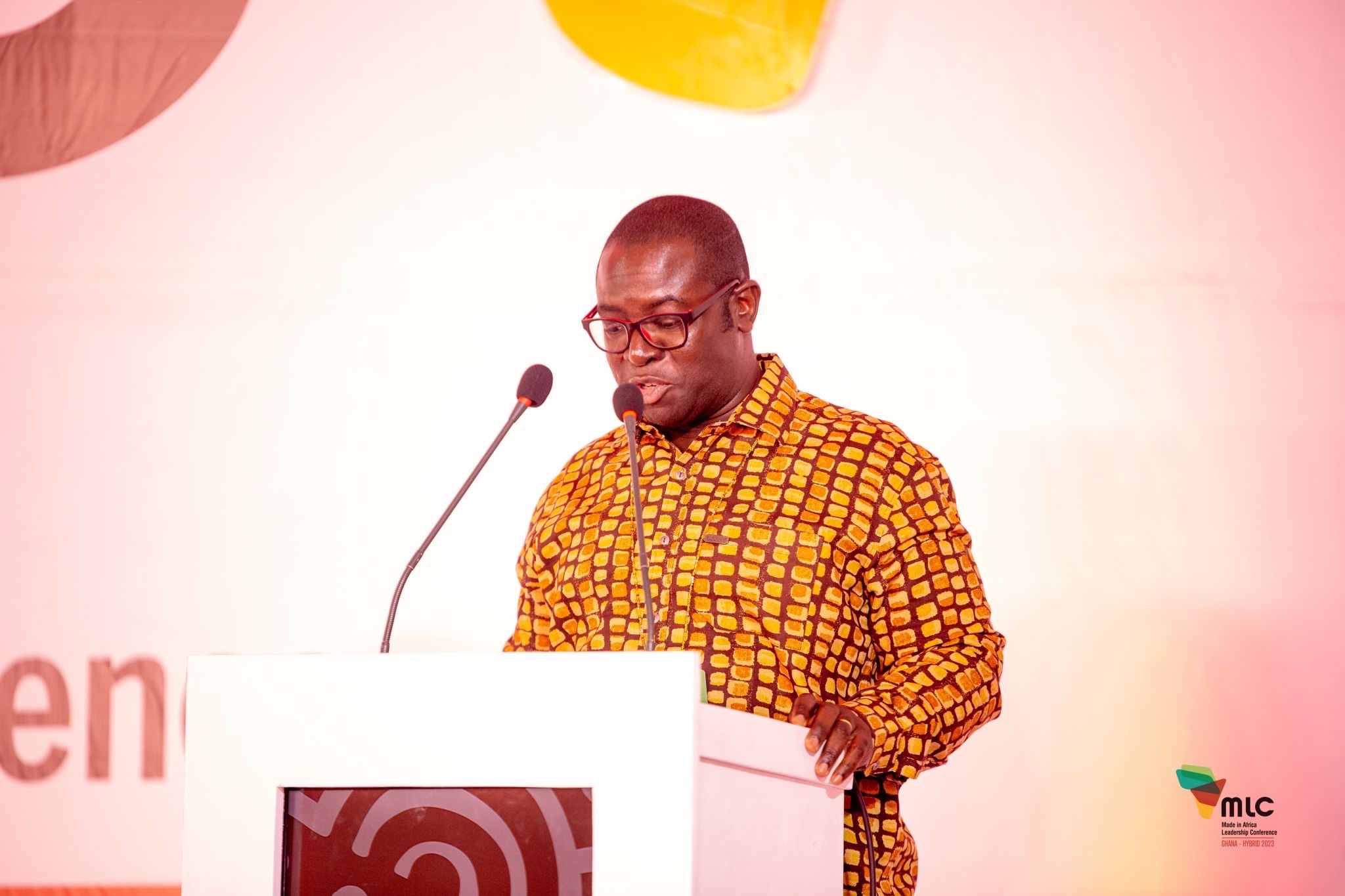
Sans Leadership–So Much to Lose, Too Much to Lose.
The following was shared as a TED-like talk to open the Made in Africa Leadership Conference by BCA Leadership on June 14 at the Marriot Hotel, Accra, Ghana.
My uncle died. My mom’s youngest brother. He came over to Ghana from the United States, where he had lived for decades, and fell ill. He died in the very hospital I worked in at the time. In fact, he died on my ward. But I can swear it wasn’t his disease that killed him. It was leadership, or rather the lack thereof. Leadership is too important for doctors not to have it.
Some of the most important things in life are not taught in school, like leadership. When some of my friends from university got into government I did exhort them: “Nobody taught us Jack about leadership. LEARN LEADERSHIP! CONTRACT COACHES! Leadership is not just caught; it is taught.” Did they listen? Ha!
Ironically, communal, national, continental or even global leadership, is a deeply person-al thing. It takes deeply transformed leaders to deeply transform society. Authentic leadership begins with aligning what goes on in a leader’s head and heart with True North. Leadership principles or True North are no respector of persons—red or yellow, black or white.
Two days from now, we will be officially launching the 20th anniversary celebration of The HuD Group, a holistic leadership organization started by nine young Africans in Accra. From one country in West Africa, it now has presence in 24 countries, on all six continents. Out of Africa to the Rest. From a former Rwandan refugee now in executive leadership in Uganda to a former child soldier in Sierra Leone now a high-ranking bank official in his homeland, to a Chinese-Canadian who we trained via Skype when she was an international medical student in Australia, a lot of transformation and impact has been achieved but in Ghana in particular I feel much of our gains have been eroded by not giving adequate attention to political leadership.
So today is the first of two important occasions this week where I will be drumming home this point with all my heart, liver, spleen and intestines: “Leadership is too important to leave it to politicians alone.” AND with 90% of African businesses being SMEs, creating 60-80% of our jobs and accounting for 40% of our GDP, what we do here at MLC this week for African leaders and African leadership is wildly important.
When two 14-year old stowaways from Guinea, Yaguine and Foday, froze to death in the landing gear of an Airbus 330 from Conakry to Brussels, they had on them a hand-written letter labelled: IN CASE WE DIE… to the Messrs. members and officials of Europe.
They said, among other things, “We have the honor and pleasure and great confidence in you to write this letter … we appeal to your solidarity and kindness for help in Africa. …we, African children and youth, ask you to create a great, efficient organization for Africa to allow us to progress. …we want to study and we ask you to help us in Africa to study to be like you.”
You should find and read the whole letter here—it will thaw and tear your heart. And that was 24 years ago. Has anything changed?
It’s time for Leadership Made in Africa that makes Africa work for Africans. BEFORE WE DIE. Yes we can, partnering and collaborating to reimagine and reform the Africa that we want! Twende! Let’s go! Let’s do this!
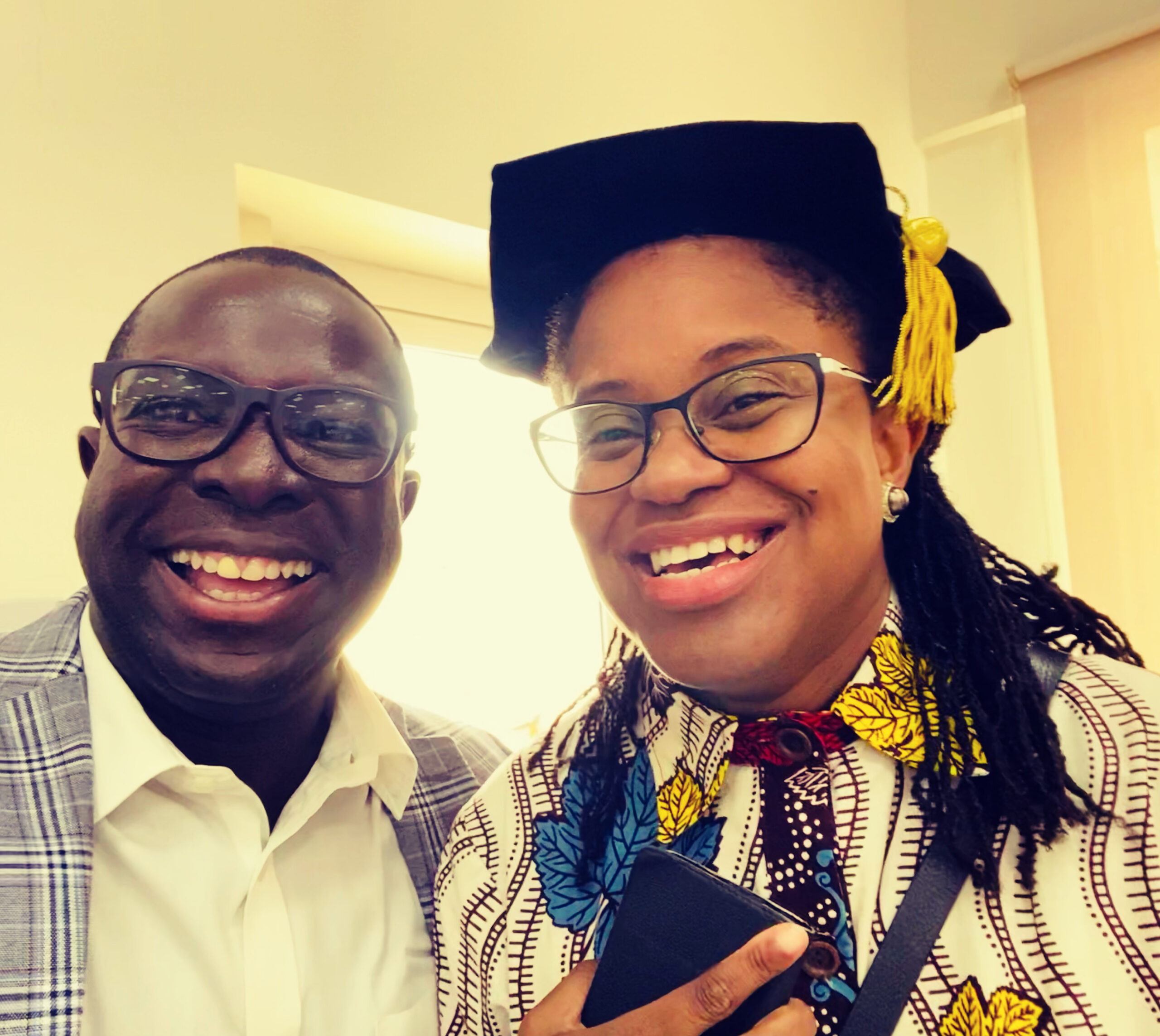
To Compete or To Complete? That is the Question.
Dr. G. Ayorkor Korsah (née Mills-Tettey) and I shared many hearty laughs at the VIP lounge after Ashesi University’s impressively inspiring commencement ceremony last Saturday, June 3, 2023. She is a Senior Lecturer in Computer Science and Robotics, and as department head, Computer Science & Information Systems, she was in her element dolling out degrees to deserving graduates. But we have a 28-year history of rivalry.
This wasn’t our first meeting. Nearly three decades ago, in 1995, we were impassioned opponents. Each of us was part of a trio representing our high schools in the semi-final of the Brillant Science and Maths Quiz on national television. Brillant was what it was called, yes, no typo there. That was the name of the blue bar soap by Unilever that was the title sponsor OF the competition. Much has changed since then. National Science and Maths Quiz, it’s now called. Very appropriate. Prime Time was in its prime, producing this feast of brilliance. They seem to have kept their shine, now in the hands of the next generation of Mensah-Bonsus.
THE LADIES WERE LOVED
Our battle was held and filmed at the Great Hall of the University of Ghana, Legon. Technically, this should’ve been a ‘home match’ for me, in my own territory, since the venue was barely a mile from my home, No. 14 Legon Hill. But no. Everyone was rooting for the über smart all-ladies team from Wesley Girls. Can you blame them? Even now they would be a delight; how much more in those medieval ages of STEM in Africa. Come to think of it, the now-ubiquitous ‘STEM’ term for Science, Tech, Engineering and Math had not even been cooked yet. The STEM acronym was only introduced in 2001 by scientific administrators at the U.S. National Science Foundation (NSF). Girls in Science were hallowed in the 1990s. Even I admired them, but my mission was to win for my school. No distractions.
My Achimota School team was made up of three boys, the three musketeers, although we are the first co-ed public school in the country as far back as 1927 and had science girls who rocked. Needless to say, the competition against the Cape Coast chics was fierce. We had both earned our way to the penultimate in the southern zone.
We inflicted what is arguably the most painful defeat Geyhey has ever suffered at the science and maths quiz. It was veeery close. Even the camera crew were downcast when the celebrity girls lost, visibly disappointed. We made enemies that day. Some couldn’t even hide it.
SOME OTHER LADIES, SOME OTHER TIME
But as it turned out: it’s not the whole word that hated us. Some girls loved us. I was the recipient of umpteen letters of adulation from young ladies all over the country. They happily introduced themselves, sometimes with atrocious photo inserts, and poured their admiration on me—about my intellectual prowess among other things which will distract from the point of this article. Now I’m not sure all of it was appropriate for seventeen.
Even the Weygeygey girls became friends later when things cooled down. After all, “if you can’t beat them; join them,” as they say. That’s how I ended up with the various names in that year group, some of whom became colleagues at the University of Ghana Medical School, as friends. Zanetor Rawlings, first daughter of the then Flight Lieutenant-retired president of Ghana, even visited me in Achimota School at some point. Like me, she would later pursue Medicine too; but in Ireland. I once warned her at a party in Nana Ama Barnes’ home on Legon Campus that if she dared ended up schooling outside Ghana after her revolutionary dad had messed up (yes, teenagers are fearless!) our educational system so, I would be really mad. I guess I’m still mad. A little. She has since returned and been admiringly serving as a Member of Parliament for the Korle Klottey constituency of Accra. In any case, seeing affliction metted out to a certain young man who hang around her at the time, involuntary hair-shaving at the Osu Castle and all, it might have been providence that I stayed at arm’s length.
NOTHING BUT ADMIRATION AND RESPECT
But I digress. Back to the main lady Gertrude, as we called Ayorkor then. She was and is brilliantly brilliant. We only beat her team by strategy and a stroke of luck. Call it grace, if you like. Those girls were on fire! Ayorkor, after 1995, went on ahead to pack up four degrees including two Bachelor’s, a Master’s and a PhD. Dr. Korsah grew up in Ghana and Nigeria, and as a child, she wanted to be an astronaut and an engineer. Ayorkor didn’t join the majority of us that continued to Ghanaian tertiary institutions but went to Ivy League Dartmouth to major in engineering. She attended Carnegie Mellon University for her doctoral work in computer science, obtaining a PhD in 2011.
Ayorkor Korsah is all-round passionate about the artificial intelligence (AI), robotics, algorithms, and programming courses she teaches on the Ashesi Hill but so is she about expanding robotics education in Africa for every Kofi and Amma. That’s why she co-founded the African Robotics Network (AFRON) over a decade ago with a robotics professor at the University of California, Berkeley, Ken Goldberg.
Anyele my wife and I really found a common sweet spot with Ayorkor last Saturday when we coincidentally discovered our common passion for literacy. Being someone who has shared with the BBC how humans and machines can collaborate and combine their strengths, Ayorkor once, over a dozen years ago, experimented with an automated reading tutor in the quest to improving child literacy in Africa. She has a paper on it in the Information Technologies & International Development journal, vol. 6 no. 2, 2010. We are keen to collaborate with her and her bright Ashesi students at our EdTech company, Perbi Cubs, for bigger, brighter and better outcomes for Africa’s precious cubs.
NOT A BOUT
Ayorkor beat me to full-time lectureship and will most likely beat me again to professorship (she so deserves it). But as she, Anyele and I continued our hearty conversation, including recruiting some of her students to practice what she teaches at our Edtech, we got to know she has two little ones of her own, younger than our last two. And we have seven. We beat her to that, fair and square. She even just married, in light of our sixteenth year, and transitioned from Mills-Tettey to Korsah.
Enough of these beatings! Really we’re all grown now and know, for sure, that life isn’t a race against each other. Nor is it about a bout. Rather than compete like we did in our teens, we now learn to complete one another in our adult years for the greater good—the Good Society. In lockstep, we will keep producing holistic emerging leaders, formally like Dr. Ayorkor Korsah does with degrees at Ashesi and informally and semi-formally like I do at The HuD Group. Ashesi turned 20 last year and we turn the same this year. Patrick Awuah, our mutual founding friend of Ashesi will be keynoting at The HuD Group’s presser on June 16, 2023. I was telling him that maybe I should’ve started a Uni too instead of going the CSO (Civil Society Organization) route. But nay, to each one their own. And we compliment, collaborate and complete each other as we all strive hard and long towards the Africa we want.
And as if by divine design, one of the Presec folks who beat our Achimota team in the finals of the Brilliant Science and Math Quiz 1995 southern zone competition ended up as my Biological Sciences course mate and even my room mate at Legon Hall, University of Ghana. We both competed for the few slots at med school available to our Leviathan-sized cohort and made it–from the same room!
There’s a time to compete and a time to collaborate. For me, to complete and not compete today as professional pals and fellow family framers of the same generation is a no-brainer. Here’s to answering life’s real tough questions and quizzes together. Congratulations, Dr. Ayorkor Korsah, for continually raising the bar.
Post script
And oh, Anyele and Ayikai, Ayorkor’s engineering whiz kid of a younger sister, have been tight friends for a quarter-of-a-century, going way back to their Wesley Girls days.
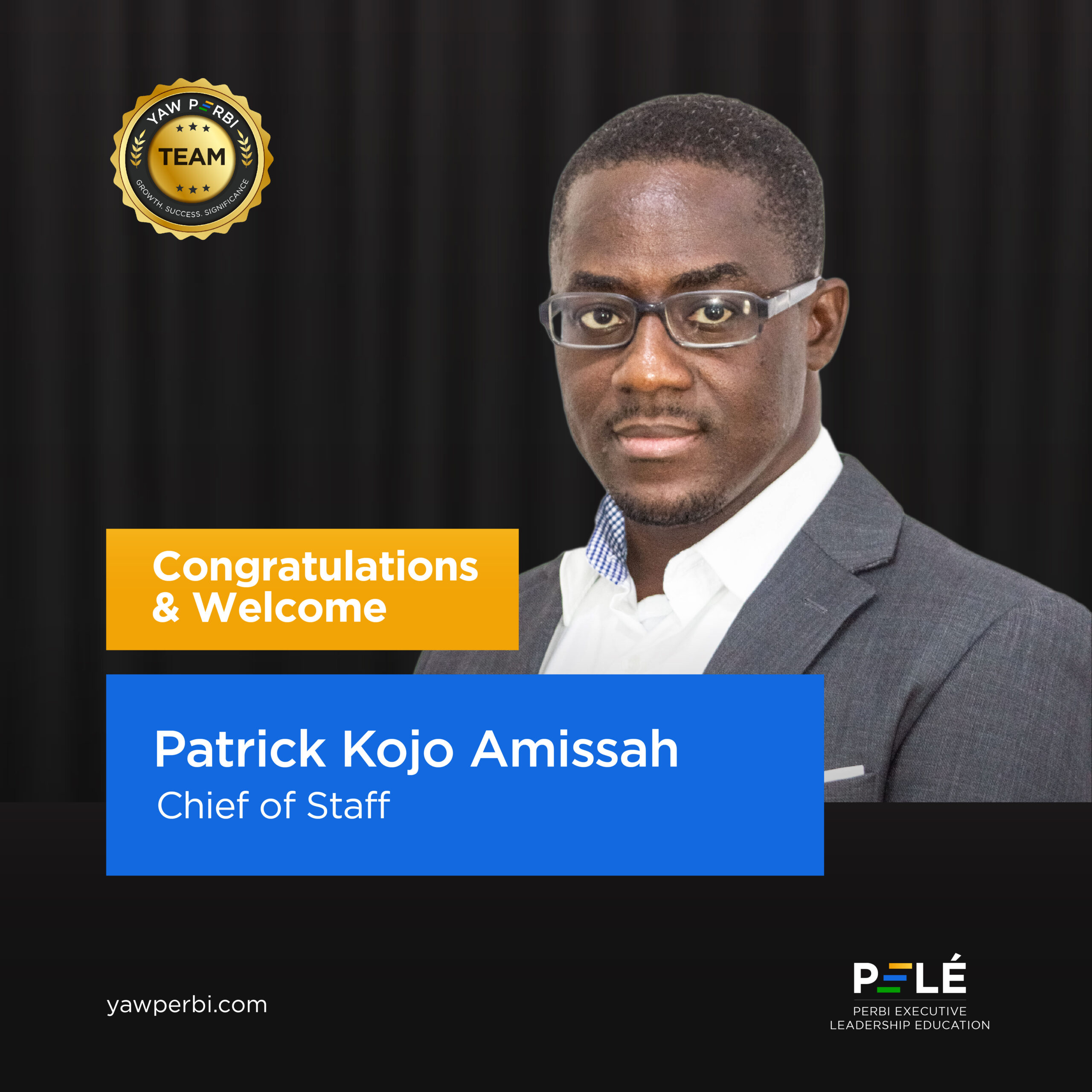
Perbi Executive Leadership Education (PELÉ) Gets New Chief of Staff: Introducing Patrick Kojo Amissah.
Perbi Executive Leadership Education (PELÉ) and allied Perbi establishments heartily welcome Mr. Patrick Kojo Amissah as our new Chief of Staff. Kojo Amissah is a versatile professional with experience in organisational leadership, team and operations management. He believes in striving for excellence and critically analysing problems with the goal of coming up with practicable, innovative solutions. He has worked in the educational, publishing and financial sectors.
Kojo’s previous work experience includes co-managing a start-up (Catalyst Learning Limited) and growing it into a sustainable firm. His responsibilities included structuring and establishing different roles and tasks, recruiting and training staff, establishing systems, managing finances, and planning and executing projects. For over three years he led in the development, printing and distribution of over five million copies of textbooks and workbooks to various schools across Ghana. He managed communications and relations with foreign printing firms including negotiating prices and planning the delivery of printed books.
We are convinced that the skills and knowledge gained from these experiences will enable him to quickly adapt to the demands of the Chief of Staff role at PELÉ and to exceptionally perform the outlined responsibilities. Mr. Amissah possesses good leadership and team management skills which he honed while serving as Team Leader, Curriculum Development and as Chief Operations Officer. Watch out for PELÉ’s online leadership courses to be launched by mid 2023.
Mr. Amissah developed important team building and conflict management strategies as he directly and indirectly managed over thirty individuals performing different roles. He also possesses good negotiation skills and valuable stakeholder management experience. At PELÉ, we believe these are important transferable skills that will aid his interactions with staff of Perbi Executive Leadership Education and affiliated organisations like Perbi Cubs, Kwiverr, The HuD Group, Send Africa, Adeshe Real Estate, ISMCanada, PAIS, Africa to the Rest, BCA Leadership, the Lausanne Movement etc. Kojo takes the baton from Ashesi cum University of Warwick alumna Araba Andoh who laid pioneering tracks for the role.
According to Kojo, “I am highly motivated to serve in the role because it provides the opportunity for me to put my unique mix of experience in leadership, operations management and publishing to use in the worthy cause of growing executives to make significant impact in society. I also believe that working directly with an accomplished leader and entrepreneur like Dr. Yaw Perbi is an unmissable opportunity to grow professionally.” Among Kojo’s first tasks will be helping to host the incoming BCA Leadership Made in Africa Leadership Conference, launching PELÉ’s avant-garde DeepLEAD online leadership course and providing operational support for both The HuD Group’s 20th anniversary activities and Kanéval by PerbiCubs/UNESCO Accra World Book Capital. In commemoration of the latter, Dr. Yaw Perbi seeks to (re)publish all his two dozen books.
We welcome Mr. Kojo Amissah at this inflexion point where YAW PERBI is transitioning to PELÉ (Perbi Executive Leadership Education) to maximize team potentials beyond the availability and capability of Dr. Yaw Perbi as an individual. PELÉ by YAW PERBI is an Executive Education firm that offers authentic and customized relationships and resources to C-Level executives to grow personally, succeed professionally and become significant societally. PELÉ’s vision is to see a flourishing global ecosystem of authentic leaders characterized by growth, success and significance.
Kojo wields a Bachelor’s degree from the University of Ghana and an MBA from Coventry University. He is a practising catholic. Akwaaba, Kojo. Bienvenue, Monsieur Amissah. Here’s to your own growth, success and significance. Together, let’s carpe diem and make a dent in the universe!

